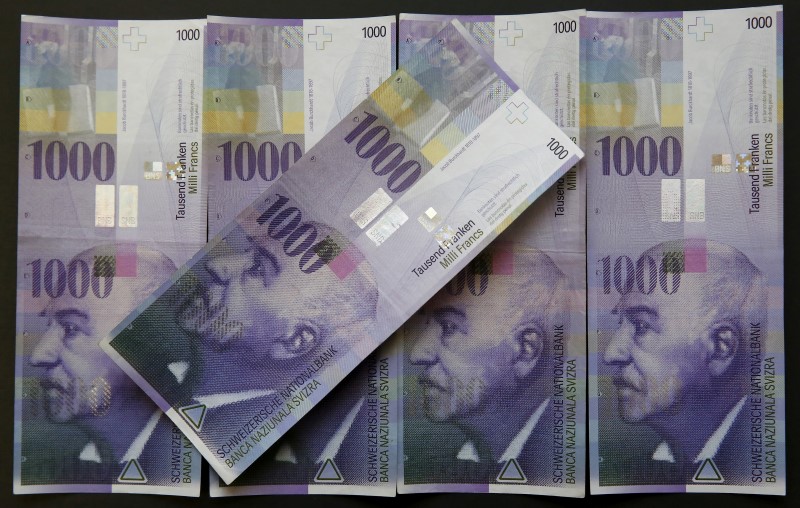By John Revill
ZURICH (Reuters) - When Britain voted to leave the European Union, "I thought 'Oh, no," said Oliver Mueller, chief executive of an association of Swiss manufacturers who are acutely aware of how much their strong currency is hurting them.
The Swiss franc is where many investors seek safety in a crisis -- so for businesses in Mueller's Swissmechanic association the risks thrown up by Brexit mean their products get more expensive for consumers earning pounds or euros.
"Companies have done a lot (to keep prices competitive), but some simply cannot do any more," Mueller said.
"Some could disappear, maybe a company where the owners want to retire, and they decide just to lock the doors, turn out the lights and let the company fade away.
"Others may move to other countries with part of their production."
The Swiss National Bank is well used to selling its currency and when the Brexit outcome became clear on June 24, it soon acted to drive the franc's value down from a 10-month high.
On Friday the franc was trading around 1.09 per euro, not much changed from before the vote.
But that's scant consolation for exporters who fondly remember the days before the 2008 financial crisis, when a euro bought 1.6 Swiss francs or more.
"With the increase in the franc, you have to either hope your customer will pay more or you have to bring down your costs," said Mueller. "But that's often impossible."
A more highly valued franc increases costs for many Swiss companies while reducing the value of their sales abroad.
"We've all had a tough few years and now it's going to get worse. We could end up losing a lot of companies because of this vote," said Mueller, who is also a board member at Bernex, a maker of components for plastic injection moulding machines.
FRANC SHOCK
Swiss businesses are still trying to adjust to the 'franc shock' of January 2015 when the SNB's dramatic decision to lift a cap against the euro sent the Swiss currency skyrocketing. The franc remains around 10 percent higher than before the cap was lifted.
What happens to the euro is particularly important to Swiss companies because the euro zone is Switzerland's biggest export market, accounting for 44 percent of its exports in the first three months of 2016.
Britain is also an important market and is Switzerland's fifth biggest export destination, buying more Swiss goods than China, according to Swiss customs data.
W.Schneider & Co, based in Langnau am Albis near Zurich, which makes mirror cabinets and illuminated bathroom mirrors, fears uncertainty will make Britons more cautious about spending.
"We don't know if British people will stop buying new bathrooms, but there could be some reductions with people not doing their houses up or fewer new houses could be built," said managing director Martin Holenweg.
With the franc's strength already weighing, one third of Swissmechanic's 1,400 member companies reported a loss in 2015 in a poll conducted before the Brexit vote. Around a quarter expect still to be in the red this year.
It is not just smaller companies who are feeling the pain.
Exports from Switzerland's watch industry fell nearly 10 percent in May as watchmakers struggle with a strong currency, as well as the effect of Islamist attacks in Europe and a slowdown in Asia. Swatch, the world's largest watchmaker, warned on Friday that its profits would at least halve in the first six months of the year.
"NO ALTERNATIVE"
Economists have also downgraded their forecasts for Switzerland given the shock to the European economy.
The BAKBasel economic institute has cut its outlook for Swiss economic growth to 1.5 percent for 2017 and 2 percent for 2018 from 1.7 percent and 2.2 percent respectively, although it expects little impact from the Brexit vote in 2016.
"We will have to wait for six months before we see the real impact," said Jan Atteslander, head of international relations at business lobby Economiesuisse.
"There are lots of questions and not many answers, and nobody likes uncertainty."
Although Birchmeier, a company making agricultural and garden sprayers, is still profitable, its owner Juerg Zwahlen notes: "Six years ago the franc was at 1.65 versus the euro and now it's 1.09. That's a massive difference and companies can only make up so much with innovation and efficiency gains.
"The export industry is being squeezed. A lot of companies have reduced their business or cut their staff or moved out of the country."
His company has already increased working hours for the 55 employees and sped up the introduction of new products to remain competitive.
Bathroom cabinet maker Schneider is seeking more flexible working, aiming to remain profitable even if the euro reaches parity with the franc.
"We hope it won't happen, but we expect the franc to be trading at 1:1 against the euro by 2020," said Holenweg, vowing to maintain profitability at that exchange rate.

"We have to, there's no alternative."